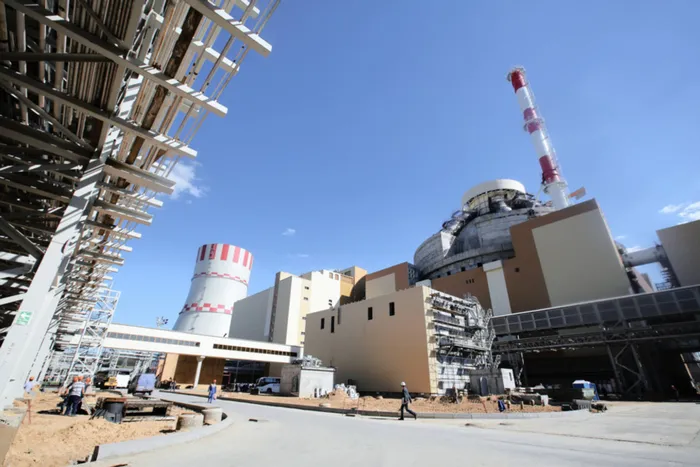Alarm over SA-Russia campaign

Workers pass by a new power unit under construction at the Novovoronezh NPP-2 nuclear power station, operated by OAO Rosenergoatom, a unit of Rosatom Corp., in Novovoronezh, Russia, on Wednesday, June 3, 2015. Russian President Vladimir Putin offered to help Egypt develop a nuclear-power industry after signing an accord with his Egyptian counterpart Abdel-Fattah El-Sisi to build a plant for electricity generation. Photographer: Andrey Rudakov/Bloomberg Workers pass by a new power unit under construction at the Novovoronezh NPP-2 nuclear power station, operated by OAO Rosenergoatom, a unit of Rosatom Corp., in Novovoronezh, Russia, on Wednesday, June 3, 2015. Russian President Vladimir Putin offered to help Egypt develop a nuclear-power industry after signing an accord with his Egyptian counterpart Abdel-Fattah El-Sisi to build a plant for electricity generation. Photographer: Andrey Rudakov/Bloomberg
Durban - The agreement between Russian company Rosatom and the South African government to “educate” South Africans about the benefits of nuclear energy is worrying environmental organisations.
Greenpeace warned about the “educational” agreement between Rosatom, one of the front runners to build multibillion-rand nuclear plants in South Africa, and South Africa’s Department of Energy.
South Africa is seeking partners to build nuclear facilities to supply 9 600MW of nuclear energy between 2023 and 2030.
The agreement is seen as controversial because Rosatom is one of the companies that will be bidding. Others in the running are China, France and the US.
“The fact that the South African and Russian governments have agreed to go on a pro-nuclear communications offensive should be ringing serious alarm bells,” says Melita Steele, senior climate and energy campaign manager for Greenpeace Africa.
The requirement for a communication plan is contained in the second memorandum signed between the Department of Energy and Rosatom that was released in July this year.
The memorandum stipulates joint efforts of the parties aimed at promoting nuclear power in South Africa.
Awareness
It stated the need to increase the awareness of local residents about modern nuclear technologies used in the power industry and in other industries, and ensure that the public warmed to nuclear power as an energy source.
The communication programme would involve the organisation of round-table discussions and other events aimed at promoting nuclear power and technologies.
Steele questioned why such an agreement would be put in place, and only with Russia, while excluding the other interested parties. “What is clear is that the South African government has signed multiple nuclear agreements with multiple countries, and that in public, the South African government claims that a decision has not been made regarding the decision of which nuclear vendor to go with.
“A decision to have a joint media strategy with Russia certainly seems like a step too far in the face of what is supposed to be a transparent and accountable bidding process,” she said.
She said nuclear power was not the right step for the country. There was opposition to nuclear energy “for all the right reasons”.
“Globally, nuclear projects are famous for delivering well behind schedule and over-budget, which is the last thing that is needed in South Africa.”
Attempts since last week to get comment from Zizamele Mbambo, Deputy Director General Nuclear Energy in the Department of Energy, have been unsuccessful.
THE MERCURY